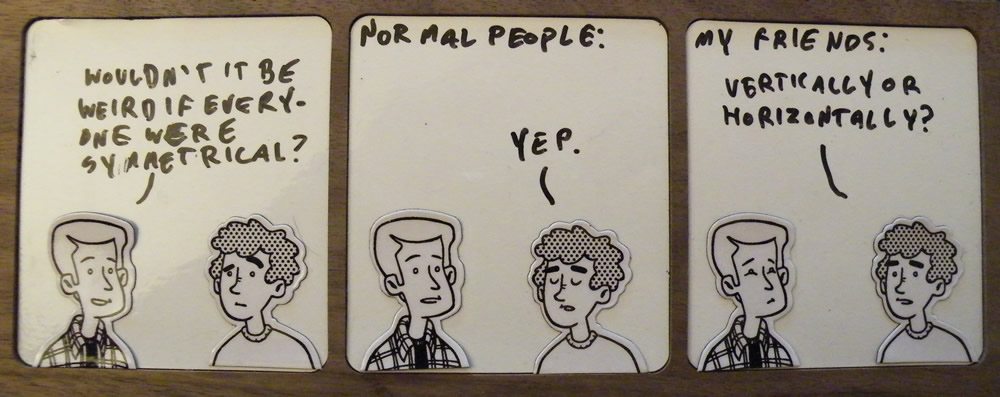
The first Finish Day I heard about was part of a local technology conference in Bloomington, Indiana. As part of their multi-day event, The Combine invited designers, coders and startup types to come to a common location and spend the day getting a project monkey off of their backs. The specifics of each person’s to-do list differed, but participants were joined by the common desire to finish what they started.
We applied this thinking to the last day of our family Geek Camp. Mentors from two tech companies spent some time with the kids, to provide feedback and offer them encouragement. By the time our evening showcase rolled around, campers had published 15 videos (including a couple copyright-challenged ones) and designed a handful of games. We paused long enough along the way to enjoy the fruits of a Kickstarter project.
This is a report from the field:
The Kindness of Strangers
One of the central take-aways for our campers is that technology resources are available to them beyond the screen. My hometown is host to a major research university, a startup incubator and many other organizations and people that make Bloomington a rich tech center. Coupled with a Midwestern generosity that seems to compel residents to give their time to others, it doesn’t take that much effort to find locals willing to help kids learn geeky things.
Two such organizations came knocking on our door last Friday to take a look at what the campers were producing. Chelsea Sanders of Blueline Media, a digital media co-op, and a trio of game designers from Studio Cypher (Will Emigh, Nathan Mishler and Ian Pottmeyer) spent time talking to the kids about Geek Camp projects. All of the mentors were great at giving the kids’ projects their attention and offering critiques to encourage future iterations.
Since all of the kids worked on videos and only a few attempted to create a new game, Sanders had more content to review. As her colleague Tucker Gragg had done during our orientation the week before, Sanders established a rapport with campers, patiently asking about how they captured their video and made editing decisions. She helped some young filmmakers add a few sound effects, and suggested an iPhone app (Splice) for future camps, to help lessen the demand for laptops.
Similarly, the game design experts listened to one camper explain how he planned to improve on Minecraft. As part of his effort to better articulate that vision, he had created a mock game board out of Lego. Two other campers showed off the game they created after being handed some random pieces as part of a design challenge. My favorite idea made use of Dice Cards to encourage player storytelling in an RPG.
A big part of the Studio Cypher mission relies on public outreach like this. The group has run annual game jam events in the past, along with quarterly “BIG Night” gatherings of independent game developers. Studio Cypher hosts a monthly playtesting night, as well, to give feedback on game design projects from the community while soliciting feedback for their own games.
“We’re also planning our first conference for 2014, Sigma Play,” says Emigh, “to bring together game designers and enthusiasts from the computer, mobile, tabletop, and boardgame fields.”
All of these initiatives support an effort to strengthen our gaming culture. When Studio Cypher began 7 years ago, no one had a smartphone. The games the company designed had to adapt to new forms and possibilities. (“Finding out what works as a company requires a lot of trial and error,” says Emigh, “or, as we like to think of it, playtesting.”) Although the technology evolves, the mindset needed to make games remains constant… and is fast becoming a core skill helpful in improving professional interactions and critiquing media.

The Influence of Kickstarter
One of Studio Cypher’s recent projects—Stickers in Public—was a successful Kickstarter campaign to create games for public spaces and conferences. As a backer, I’m anxiously awaiting those rewards to show up later this month. Although they weren’t available in time for this year’s camp, a number of other Kickstarter products were.
With most of the video editing winding down, we gathered the campers around the television to screen Dear Mr. Watterson, a documentary about the making of geek staple Calvin & Hobbes. The 90-minute documentary lost some of our younger campers, who were hoping for more comic than interview, but their appreciation for the screening will grow in a few months when the movie is released in theatres. I was able to press play because of my willingness to join over 2,000 other people in funding the film last year.
Kickstarter is proving to be a great source for geeky activities and artifacts. Thanks to projects backed over the last several months, we had a set of Dice Cards to inspire game design and a couple dice rings to add some incentive to play games. On display in our main hallway was one of Erik Heumiller’s magnet comic boards, which got a little use during the week.

Next year’s Geek Camp will benefit from a slew of incoming rewards, including Stickers in Public, a few other games, the 3Doodler, and maybe another documentary on Dungeons & Dragons. All it takes is a bit of expendable income and a lot of patience.


